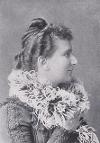Isabella Lilburn
Their names will be remembered for evermore
Porridge, haggis, socks and, most of all, soap: it was the little things that made a difference to the daily lives of soldiers. Living in mud, and unable to wash, discomfort and hunger made for miserable conditions. At the start of the war, the mass mobilisation of recruits was not matched by supplies, and the public were called on to send clothes, toiletries and food. Isabella Lilburn used her family's business connections to set up a depot to get supplies where they were needed.
Home Comforts
Widowed the month the war began, Isabella focused on the war effort. Her youngest son William had joined The Highland Light Infantry in 1905 and her eldest, James, was an officer in the Territorial Force at the outbreak of war. Isabella set up a depot from Glasgow's Grand Hotel in Charing Cross to gather donations for soldiers. An advert in the Glasgow Herald read: "Comforts for the men going on active service will be gratefully received." Glasgow council also had a depot at St Vincent Street.
Lieutenant William Lilburn took the first donations for the 2nd Battalion, The Highland Light Infantry, to France on 26 August, 1914. They were much needed. Adjutant Keith MacDonald wrote: "My feet are troubling me now a little," not having removed his boots for six days. Heavy rain during the Battle of Aisne in September made the trenches a quagmire.
New Year Parcels
The depot run by Isabella, and Nora Anderson, whose four sons would die in the war, amassed thousands of shirts, socks, sweets and other foods. For 125 HLI prisoners being held in Germany at the end of 1914, the parcels were a godsend: "The thing we prized more than any other was soap," wrote one. In November 1915 Isabella requested "mittens, handkerchiefs, indelible pencils and plum puddings" for New Year parcels to be sent to the Grand Hotel depot.
In 1917 she appealed for "adopters" who would sponsor some of the six parcels sent to each man monthly. For the last New Year of the war, 830 parcels were dispatched from the 2nd Battalion's comforts depot, which had moved to Bath Street. The recipients included 170 prisoners of war. The organisation behind this effort was revealed in index cards that noted preferences of individual soldiers, so that donors could send favourite items. For those soldiers in the mud, the arrival of soap, knitted gloves, or some haggis, brought a piece of comfort from home.
View original referenced text here:Isabella Lilburn (PDF, 148 KB)(opens new window)
Images:
- Isabella's sister, Emma, wife of wealthy coalmaster and Lanarkshire MP Sir John Wilson, of Airdrie. Credit: Glasgow Contemporaries at the Dawn of the Twentieth Century, 1900, p206. Private Collection.
- A soldier wearing knitted scarf eats from his mess tin in front of a dugout, mud adhering to his puttees (leg wrappings). Credit: The Times History of the War, Vol 3.
- New Year's parcel, or daydream; as seen by Private R Birrell, frequent cartoonist and contributor to wartime journals. He was posted to Egypt with the HLI, describing himself as 'Artist in the Holy Land.' Credit: The Outpost (Magazine of 17th Battalion, The Highland Light Infantry), Jan 1916, p152, Courtesy of The Royal Highland Fusiliers Museum, Glasgow.








